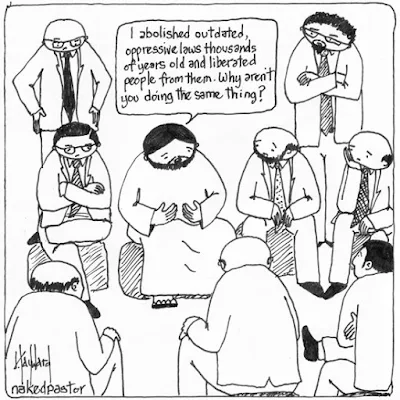What should a Christian minister look like?
by Miller Jones
Over at Banned by HWA, several of the most recent posts on that blog have provoked a great deal of thought about what constitutes a genuine Christian minister. While most of us would readily admit that an adulterer and murderer would not qualify, agreement seems to break down when other issues are considered. In other words, what are the things that qualify a person as a legitimate minister of Jesus Christ? How important are things like gender, training and credentials?
For many Fundamentalists, Paul's statements in some of his epistles about female participation in church services exclude the possibility of that gender serving in the ministry. Of course, that assumption ignores all of the scriptural evidence that contradicts such a conclusion. What about Mary? What about Priscilla? What about Lois and Eunice? Is it correct to exclude half of humanity from participating in the ministry of the church because Jewish society in the First Century had a strong misogynistic and paternalistic bias?
What about the training of the ministry? How did Christ train his apostles? Did he send them to colleges and seminaries? Weren't most of the apostles and ministers of the early church mature individuals who had years of exposure to Christ's teachings and more years of life experiences under their belts? How many young men or recent converts were elevated to the ministry? Is Christianity a spiritual or intellectual exercise? Can love, mercy, grace, forgiveness, patience, kindness, compassion, etc. be learned in a college or seminary? How important is one's understanding of complex theological, philosophical and doctrinal matters to being a successful/effective minister of Jesus Christ?
Does a license from a man-made organization make one a minister of Jesus Christ? Does an appointment by some board or some single individual (like someone claiming to be an apostle or prophet) make one a minister? Does obtaining a degree or completing some course of study qualify one to be a minister of Jesus Christ? Does recognition by the State entitle one to perform the functions of a minister of Jesus Christ? Does the vote of a congregation entitle one to be recognized as such? What kind of official credentials did Peter, John, Barnabas or Paul have?
Didn't Paul say that exceptional character was an essential element in one qualifying to be considered as a legitimate minister of Jesus Christ? Did he have anything to say about the marital status of the individual and the harmony evident within his/her household? Did he say anything about the candidate's reputation in the community at large and within the church? Did he say anything about how the person conducted him/herself in public (e.g. displays of temper and the consumption of alcohol)? Didn't Paul say that the candidate must be able to teach and provide a hospitable/friendly environment? Indeed, even if Paul hadn't (or didn't) write those epistles to Timothy and Titus, wouldn't common sense demand that a minister of Jesus Christ exhibit exceptional character (over and above that of his/her brothers and sisters in the faith)?
And, perhaps the most important consideration of all: What is a minister? Doesn't the very word evoke the word servant? Didn't Christ say that those of his disciples who wanted to be in leadership positions would have to become the servant of the others? Didn't Christ make clear that he didn't want the leaders within his church lording it over each other? Doesn't he use the symbolism of the care and nurture of a shepherd for his/her flock over and over again? Didn't he tell Peter three separate times to feed/take care of his sheep? Were ministers intended to rule? Were minsters intended to be repositories of authority and discipline? What does servant leadership mean?
Hmmmm, when we begin to ask ourselves a few questions about what a Christian minister should look like, it becomes clear to me that many of the denominations, sects and cults who call themselves Christian don't have a clue! Maybe it's time we all take another look at this topic and rethink some of the traditional attitudes that have developed about it? What do you think?




